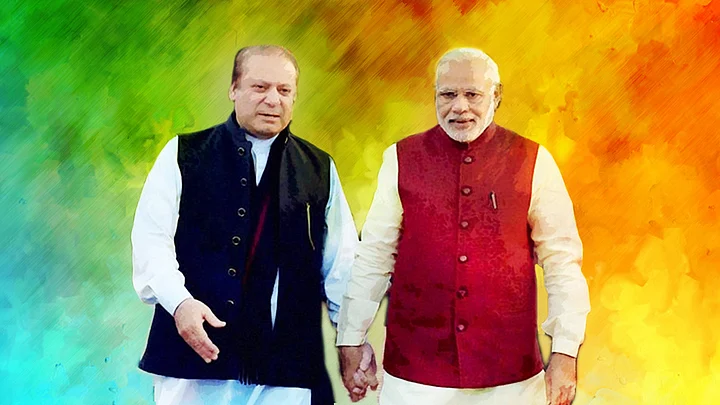- Three Indian PMs, Manmohan Singh, Vajpayee and Gujral, overlooked Pakistan’s cross-border terrorism and accepted composite bilateral dialogue. Their efforts didn’t bear fruit.
- PM Modi is following their footsteps; his efforts are not leading any concrete results as Pak seems to not be interested.
- Pakistan’s engaging Hurriyat despite India’s disapproval, and Pakistan High Commissioner’s press briefings show clear disinterest at improving dialogue at the Pakistan side
- Pakistan’s current strategy has two clear objectives. One: to gain maximum mileage out of the concocted episode of Kulbhushan Jadhav. Two: to press Modi to make yet another concession for Pakistan
Almost all Indian Prime Ministers have found it impossible to resist the temptation of seeking to establish positive relations with Pakistan. For this purpose, they have been willing to make concessions and overlook Pakistan’s abiding hostility to India. These journeys in optimism have always ended in failure but that has not deterred them; like Sisyphus, they have painfully pushed the boulder up the mountain only to see it rolling down.
.jpg?auto=format%2Ccompress&fmt=webp&width=720)
Three Indian PM’s Tried To Make Dialogue Work
Manmohan Singh, Vajpayee and Gujral, overlooked Pakistan’s cross-border terrorism and accepted structured and composite bilateral dialogue. Clearly the hope was that Pakistan would abandon the path of violence for the resolution of issues through dialogue and negotiations. Vajpayee travelled to Lahore and, in a historic gesture, went to Minar-e-Pakistan but to no avail.

Manmohan Singh undertook back-channel negotiations to resolve the Jammu and Kashmir issue, only to see his initiative end in the 26/11 Mumbai terrorist attack.

He still pursued relations and at Sharm-el-Sheikh, conceded the inclusion of Baluchistan in a joint declaration. At Thimpu, he was willing to accept that talks and terror can go together. Narendra Modi has followed his predecessors in this ever-going diplomatic process. Like them, he is now experiencing the obduracy of the Pakistani generals.

Modi Following Footsteps; His Efforts Seen Failing
Modi is virtually seeing his initiative running into sand. This is, therefore, a time for sober introspection and evaluation – not continuing with an initiative that is simply not succeeding. What were the mistakes? Three come immediately to mind.
The Mistakes
- 1.Ufa and the backflip
Having once decided at Ufa, Russia in July last year with Pakistani Prime Minister Nawaz Sharif that the National Security Advisors of the two countries would meet in Delhi to only discuss terrorism, Modi should have insisted that this decision be adhered to.

- 2. Pak’s Engaging Hurriyat Despite India’s Disapproval
Further, having once set out that Pakistani representatives should not meet the Hurriyat in a manner that gave an impression that they were a third party in the J&K issue this proposition should have been not compromised. It is true that since Narasimha Rao adopted a laissez faire approach on this issue successive Indian Prime Ministers had followed it. However, Modi had only corrected a historic mistake and his position was entirely in keeping with internationally accepted norms on separatists. The Pakistan army had refused to abide by both conditions and the August 2015 visit of the then National Security Advisor of Pakistan, Sartaj Aziz was cancelled.
- 3. Nothing Became of the NSA Level Talks
In autumn last year, Pakistan replaced Sartaj Aziz with Lt. Gen (Retd) NasserJanjua as NSA. It is here that the third mistake occurred. Janjua is a well-regarded officer who held sensitive assignments in his military career including as, Corp Commander in Baluchistan. It was believed that he was close to Army Chief Raheel Sharif. It was somehow assumed that his appointment indicated that the Pakistan army was in line with Nawaz Sharif’s thinking on improving relations with India. This assumption led to the December 2015 meeting of the two NSAs at Bangkok where the Foreign Secretaries were also present. Details of the NSAs meeting are not available in the public domain but it is clear that the Indian side felt that both the Pakistani civil and military leaderships wanted to change the course of the bilateral relations as Modi did.It needs to be recalled that Modi has publicly said that his policy seeks to change the course of history of India-Pakistan ties. Now after the Pakistan High Commissioner Abdul Basit’s press briefing it is obvious that the Pakistani generals have no interest in joining Modi on this great quest.
Pakistan’s Current Strategy
Pakistan’s current strategy has two clear objectives. One: to gain maximum mileage out of the concocted episode of Kulbhushan Jadhav. Two: to press Modi to make yet another concession and begin the Foreign Secretary official contacts to finalise the modality of the Comprehensive Bilateral Dialogue.

Pakistan feels that the Kulbhushan Jadhav episode has provided it a unique opportunity to establish moral equivalence with India on the sponsorship of terrorism. Hence its claim that Jadhav has revealed that Doval was one of his handlers. It has gone to the extent of charging India with state sponsorship of terrorism to destabilise Baluchistan and Karachi. It will relentlessly propagate all kinds of canards on this issue including through staging a well-publicised trial of Jadhav. The generals have now signalled to Modi that he should be satisfied with the action that has been taken on the Pathankot attack investigations and in turn begin the process of full bilateral engagement. That is the message from the protection through the Chinese to Masood Azhar at the United Nations.

Thus also Basit’s comment that there was no agreement on a reciprocal visit by the NIA to Pakistan to interrogate the Pathankot suspects. Leaked news reports in the Pakistani media that the JIT did not receive full cooperation in India point in the same direction. Modi’s Pakistan policy is now on test. Another concession to the Pakistani generals will only convince them that he is a weak leader. He is not, but now must demonstrate that.
(The writer is a former Secretary (West), Ministry of External Affairs.)
(At The Quint, we question everything. Play an active role in shaping our journalism by becoming a member today.)
